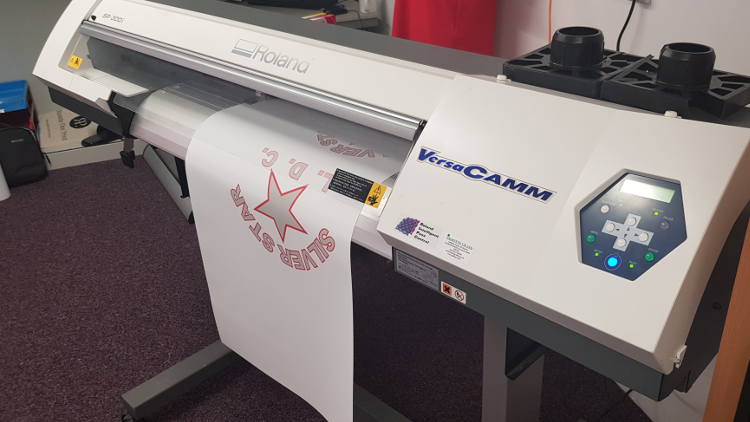Strickland House, home of the Telford After Care Team (TACT), is always buzzing – even more so now the organisation has expanded with a printing service, using equipment from Roland DG.
TACT helps all kinds of people recovering from drug or alcohol misuse, and those suffering with mental health problems. It was founded in 2012 by Robert Eyers – himself in recovery – and provides a range of services including a drop-in centre, support groups, craft sessions and more. The organisation offers training and education, providing accredited qualifications to the whole community.
It is not a charity, so it must be self-sustaining; it therefore manages a number of start-up enterprises including a landscaping business, a cafe and the printing service, called Strickland Print. As well as bringing funds to TACT, these micro-businesses provide volunteering and working opportunities to its service users, many of whom may have been unemployed for years. It's valuable experience, both as an addition to a CV and to relearn the everyday work and social skills that many of us take for granted.

Formerly located in a cramped office space on the first floor of Strickland House in Telford, Shropshire, Strickland Print has recently moved to its own space within the grounds of the building with specialist printing equipment from Roland DG. Founded in Japan in 1981, Roland DG is the world's leading provider of wide-format inkjet printers, used to create countless types of display graphics, signage, packaging, personalised products and more.
Alongside a Roland CAMM-1 GS-24 desktop cutting system, a cutting table, tools and ample work-space, Strickland Print's brand new 'pod' features a newly installed Roland VersaCAMM SP-300. This combination inkjet printer/cutter device has a width of 30" (76.2cm) to allow full-colour printing and processing of a wide variety of graphics, enabling Strickland Print to offer products such as signs,
banners, retail displays, transfers for T-shirts, fine art and much more.
The printing services are competitively priced to enable TACT's other businesses and departments to improve their visibility through marketing materials affordably, while putting money back into TACT. For instance, jam made from fruit harvested from an orchard managed by TACT can be sold at the cafe, in jars featuring labels printed on the Roland VersaCAMM.

Strickland Print is also being promoted to trade and private customers in the community. One of the first projects completed on the VersaCAMM SP-300 was two lots of T-shirts for the UK Recovery Walk in Shrewsbury – one set for a charity customer and another for TACT themselves. The business has also attracted interest from corporate customers looking for personalised bottle labels for Christmas gifts.
Strickland Print is led by Project Manager Mark Lynch, who manages three volunteers – all service users at TACT – including one team member with prior experience in printing. Mark's background is in lighting and rigging so admits that taking on Strickland Print is 'a learning curve, but a very fulfilling role', adding that learning to use the Roland printer has been 'very enjoyable'. He sees Strickland Print as part of the wider community in Telford, providing an affordable service while complementing other businesses. For instance, for anything Strickland Print is unable to provide, Mark is happy to outsource work to local print service providers.
He explains: "We're not looking for charity, we're looking for business – and that means working with other businesses. It might seem unusual to give work to potential competitors but that's what makes us part of the community."
The idea for launching Strickland Print came from TACT founder Robert Eyers himself, and is backed up by a professionally diverse board of directors, including one member from the print industry. Rob has overcome problems of his own, having initially moved from London to Shropshire to start afresh. He built up the after-care team with no funding – even setting up a recovery support group in Wellington using his own money – and says he tends to keep busy due to his 'addictive personality'. Consequently, he is always thinking about the next step for TACT – crucially, keeping in mind how it can remain sustainable while helping its service users through their recovery in any way necessary.
"I hired a room out of my own pocket and no-one came for twelve weeks. After twelve weeks people started to come, and it snowballed from there," he says, on the beginnings of TACT. "Now we have 28 paid members of staff and 40 trained volunteers, many of whom have been service users. It's all about repaying my debt and creating opportunities for people."
For Rob it's not just about creating a job or voluntary experience to add to a CV – TACT offers support that can save lives. He says that he goes to 'a lot of funerals', as sadly many people who appear to be in recovery can relapse. The grounds of Strickland House will include a memorial garden to remember everyone lost during TACT's journey.
"It's all about turning peer pressure into peer support," says Rob. "Going to work rather than going to the pub – that changes lives."
For more information on TACT, please visit www.tacteam.org.uk.





